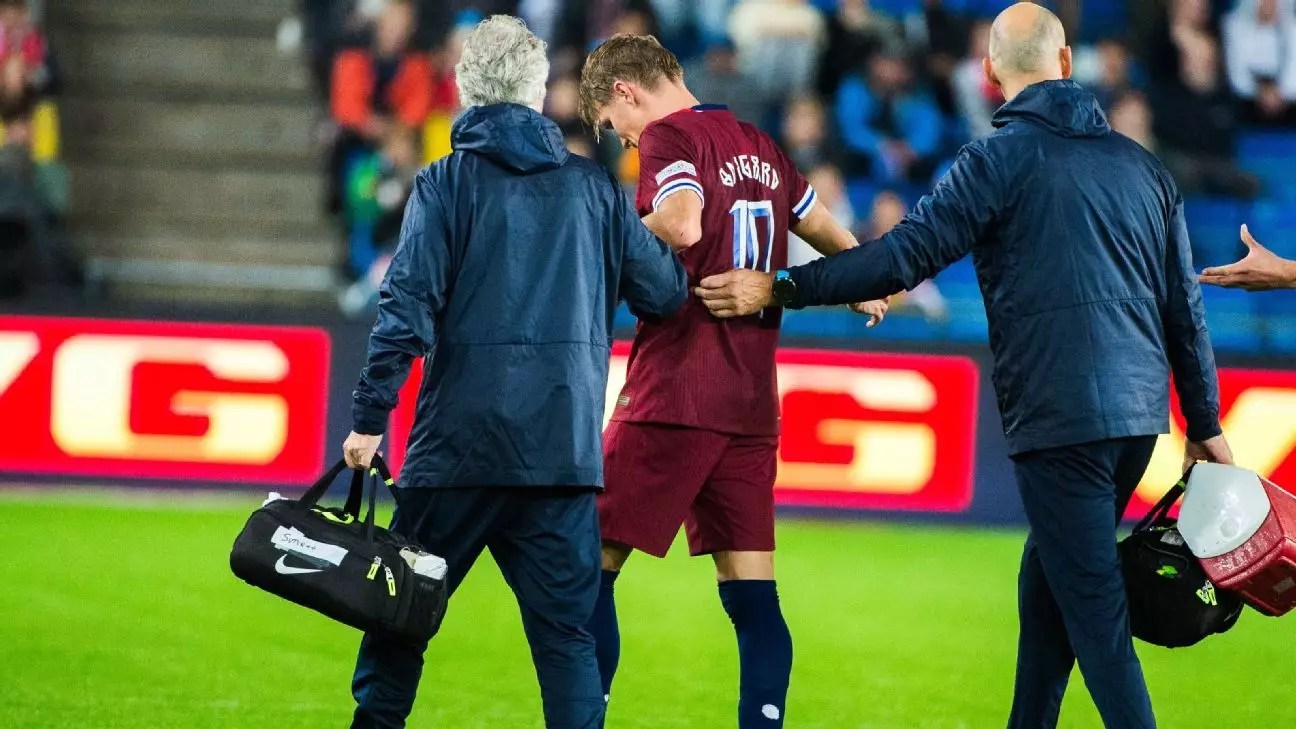The story of Martin Ødegaard’s recent challenges illustrates not only the physical demands placed on professional athletes but also highlights their emotional struggles and commitment to their teams. As the 25-year-old Arsenal midfielder recuperates from a significant ankle injury and subsequently misses the upcoming Nations League fixtures for Norway, various factors come into play that can greatly influence both his national team and club dynamics.
Injuries in professional sports are often complex events involving physical, psychological, and social components. Ødegaard’s ankle injury, described by Norway’s team doctor, Ola Sand, as “complicated,” underscores the unpredictability of healing and recovery among athletes. The six-week absence from competitive football can be particularly hard for a player who has consistently contributed to his team’s success.
Following an impressive initial period in the Premier League, Ødegaard’s injury not only stalled his personal momentum but also shifted the dynamics within the Norway national squad and Arsenal. Stepping back from the intense rhythm of training and games can be daunting. In Ødegaard’s case, he acknowledges this reality, highlighting that after an extended layoff, achieving match fitness takes time. Ensuring he is fully healthy before returning to training and competitive play is paramount to mitigating the risk of re-injury, a common concern among athletes recovering from similar setbacks.
Ødegaard’s absence from the upcoming Nations League matches against Slovenia and Kazakhstan poses significant ramifications for the Norwegian squad. His leadership and creativity on the pitch are irreplaceable assets. Players often thrive on the synergy and chemistry built through time spent together, making Ødegaard’s absence felt not only in his individual performances but in team cohesion as well.
The Norwegian Football Federation’s decision to prioritize Ødegaard’s rehabilitation reflects a broader understanding of athlete welfare, recognizing the importance of long-term health over immediate participation. In his statement, Ødegaard articulated a commendable perspective, expressing his desire to support his teammates from afar and sharing confidence in their ability to perform without him. This kind of mentality is crucial in maintaining team morale, especially during challenging periods.
From a club perspective, Arsenal’s performance began promisingly in the Premier League fixture, managing to secure three wins in their first four games, all without Ødegaard’s contributions. However, the team’s fortunes shifted when they faced less favorable outcomes against Bournemouth and Newcastle, leading to concerns about their ability to remain competitive in the league while missing one of their key players.
Arsenal’s manager, Mikel Arteta, is now faced with the dual challenge of navigating a competitive league landscape while dealing with the tactical void left by Ødegaard. To sustain their ambitions of challenging for the title, it is essential for Arteta to devise strategies that compensate for Ødegaard’s unique strengths. Creative formations, increased roles for other midfielders, and tactical flexibility may be key to bridging the gap until Ødegaard is fit to return.
The situation surrounding Ødegaard also raises critical questions about player development and management in modern football. As athletes strive to balance competitive aspirations with personal health, the importance of effective rehabilitation becomes increasingly vital. Clubs and national teams must recognize the necessity for comprehensive medical support and a robust approach to recovery, ensuring players can return to their peak physical form without risking further damage.
While Ødegaard’s absence may initially seem like a setback, it serves as a reminder of the resilience of athletes and the importance of supportive frameworks for recovery. His focus on reintegrating seamlessly into both club and national duty reflects a commendable mindset—one that prioritizes not just immediate performance, but the long-term sustainability of a successful career.
Martin Ødegaard’s situation is a microcosm of the challenges faced by professional athletes, encapsulating the intersection of health, performance, and team dynamics. As both Norway and Arsenal look to adapt in his absence, it is clear that the spirit of teamwork and dedication persists, framed by a commitment to mental and physical well-being. The road to recovery may be arduous, but with patience and support, Ødegaard’s inevitable return will be all the more impactful.


Leave a Reply